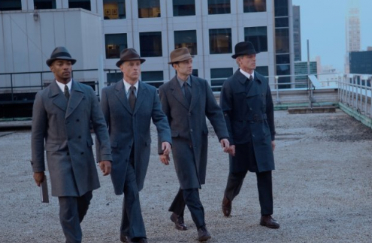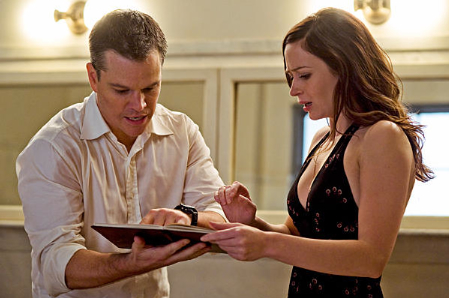 The Adjustment Bureau is one of those movies whose genre is hard to pin down. Is it an action/suspense thriller, like The Bourne Ultimatum which this movie’s writer and director, George Nolfi, also co-wrote? Perhaps it is a political drama? But the plot revolves around a love story that is suffused with science fiction. And there are clear religious themes that invite further reflection once the movie has ended. Most cross-genre films don’t work: but The Adjustment Bureau is the exception. Here is a movie all teenage and adult readers should see. You’ll love it.
The Adjustment Bureau is one of those movies whose genre is hard to pin down. Is it an action/suspense thriller, like The Bourne Ultimatum which this movie’s writer and director, George Nolfi, also co-wrote? Perhaps it is a political drama? But the plot revolves around a love story that is suffused with science fiction. And there are clear religious themes that invite further reflection once the movie has ended. Most cross-genre films don’t work: but The Adjustment Bureau is the exception. Here is a movie all teenage and adult readers should see. You’ll love it.
If the movie were primarily a thriller, it would be driven by its plot. Set strikingly in New York City and given a superb sound track by Thomas Newman, the story follows the two lead characters – David Norris (Matt Damon) and Elise Sellas (Emily Blunt), who meet surprisingly in the men’s room (!) of a major hotel on the night of Norris’ concession speech, after he has blown a big lead in his race for the Senate. The rest of the movie has to do with the efforts of the “adjusters,” men in hats, to stop these two from meeting again so Norris can fulfill the “Chairman’s” plan that he become President. There are strong chase scenes, taxis crashing, lots of running (perhaps more than Damon had in the Bourne Ultimatum), and doors that open up mysteriously onto other areas of the city. Terrance Stamp, as senior adjuster Thompson, is a worthy nemesis – as always. Can the characters escape those mysterious strangers with special powers who wear hats. These questions present themselves. But the movie is more than a straight thriller.
The film is also partly a love story, one driven by its character development. What propels the action after the opening scene is not really the suspense caused by car crashes and bowler hatted men bent on keeping the two lead characters apart. Rather it is the chemistry between Elise and David. After their kiss in the men’s room, neither can stand to live apart from each other. But they don’t know how to find each other. Viewers wonder if they will meet again. How will they escape, or can they escape, the Chairman’s “plan” which has them having successful careers apart from each other, a plan implemented by the adjustments of his henchmen in hats? Viewers will root for these lovers as obstacle after obstacle is put in their path. Here too is part of one’s experience watching the movie.
 But like the short story by Phillip K. Dick from which it was adapted, The Adjustment Bureau is not primarily a love story nor is it a suspense thriller. In fact, in Dick’s story there is no love interest, nor is there any aspect of a thriller (You might say that this is a quite radical adaptation!). Rather Dick’s story is about the chance barking of a dog that allows the protagonist to see there are mysterious plans bigger than he could have known about, plans that involve his destiny. It is this sense of a large “plan” that we are beholden to that Nolfi has taken from Dick’s story and then embedded in a new romantic thriller.
But like the short story by Phillip K. Dick from which it was adapted, The Adjustment Bureau is not primarily a love story nor is it a suspense thriller. In fact, in Dick’s story there is no love interest, nor is there any aspect of a thriller (You might say that this is a quite radical adaptation!). Rather Dick’s story is about the chance barking of a dog that allows the protagonist to see there are mysterious plans bigger than he could have known about, plans that involve his destiny. It is this sense of a large “plan” that we are beholden to that Nolfi has taken from Dick’s story and then embedded in a new romantic thriller.
In Dick’s story, as in the movie adaptation, the primary power and meaning of the story lie not in the characters, however appealing they are as “everyman” and “everywoman.” Nor is the movie a mystery along the lines of Inception or Memento, where plot provides the fuel for ignition. Instead, the power and meaning come from the sense of destiny, or fate, that propels these stories forward. It is this atmosphere, this backdrop, this “plan” of the Chairman, which performs almost like another character in the movie. How will Elise and David confront, or amend, the plan? Can they? Or is it simply a given?
 Despite great chase scenes and clever use of hats and doors, to call the movie an action thriller is to miss the mark, and risk disappointing the audience. Similarly, to label this a love story, Matt Damon’s first such role in ten years, is also to risk disappointment. For though the movie begins with real chemistry between the two leads in the opening scenes – there is humor, and candor, and connection – the focus of the movie ultimately turns elsewhere. As we watch the story unfold, we find ourselves asking questions. Is what we do somehow destined to be? Do we really have free will, or is it somehow planned out for us (by parents? Context? God? Destiny?) If we are married, for example, did we simply choose our mate, or is there some sense in which we were chosen for each other?
Despite great chase scenes and clever use of hats and doors, to call the movie an action thriller is to miss the mark, and risk disappointing the audience. Similarly, to label this a love story, Matt Damon’s first such role in ten years, is also to risk disappointment. For though the movie begins with real chemistry between the two leads in the opening scenes – there is humor, and candor, and connection – the focus of the movie ultimately turns elsewhere. As we watch the story unfold, we find ourselves asking questions. Is what we do somehow destined to be? Do we really have free will, or is it somehow planned out for us (by parents? Context? God? Destiny?) If we are married, for example, did we simply choose our mate, or is there some sense in which we were chosen for each other?
The Scriptures are full of such questions. “…work out your own salvation with fear and trembling, for it is God who is at work in you, both to will and to work for his good pleasure.” (Phil. 2:12b-13) Do we choose our life, or is it chosen for us? “The human mind plans the way, but the Lord directs the steps.” (Prov. 16:9) What does it mean to plan then? “Our God is in the heavens; he does what he pleases.” (Ps. 199:3) Yes, but after God pronounces to Moses his wrathful judgment on the Hebrews for building an idolatrous golden calf and Moses pleads for him to not do this, the text says, “And the Lord changed his mind about the disaster that he planned to bring on his people.” (Ex. 32:14) Does God change his mind?
 The strength of The Adjustment Bureau is its ability to tell an adventure-filled love story that takes viewers deeper than they expected to be taken, to ask a series of questions about life that is common across religious traditions. Is there a “plan” for my life? Am I free to choose, to alter that plan, or to create a plan, or to live into that plan? Is there chance? Free will? Fate? Are we destined, and if so by whom, or what? These are the perennial questions that Nolfi, the filmmaker, has embedded into his story and the result is compelling. He has given us a movie that teenagers and adults alike will enjoy… and then ponder.
The strength of The Adjustment Bureau is its ability to tell an adventure-filled love story that takes viewers deeper than they expected to be taken, to ask a series of questions about life that is common across religious traditions. Is there a “plan” for my life? Am I free to choose, to alter that plan, or to create a plan, or to live into that plan? Is there chance? Free will? Fate? Are we destined, and if so by whom, or what? These are the perennial questions that Nolfi, the filmmaker, has embedded into his story and the result is compelling. He has given us a movie that teenagers and adults alike will enjoy… and then ponder.
At Fuller Seminary where I teach, we pre-screened the movie twice at a near-by Cineplex which seats close to 300. And afterwards, we had lively discussions about the film and about the audiences’ understanding of how d(D)estiny played out in their own lives. Was there, as Calvin, Luther, and Aquinas claimed, a secret will of God, something in addition to God’s revealed will that governs our lives? At the second screening to a full house, a rabbi and an Imam joined me and the director, George Nolfi, for an inter-religious dialogue about David and Elise’s free will, or lack thereof. How did we understand the God of Abraham, Isaac, and Jacob, a God we all believe in, to direct the lives of men and women? The same quandaries proved common to us all.
The movie’s questions have been present for millennia. But seldom have they been served up in such an engaging way. Here is a movie to go to with family or friends, and then to stop at Starbuck’s afterwards and talk about not only Elise’s and David’s lives, but our own.
Questions on The Adjustment Bureau:
1. Who do you think the “chairman” is in this movie or who/what does he represent? A strongman? Someone caring? Someone relational? And how does this compare with your understanding of God?
2. Who are the men in hats? What is the mission of these “adjusters” in the film? Do you believe there are men wearing hats or other beings out there that quietly guide us toward a path?
3. Do you think Matt Damon’s character David was justified in defying “the plan” for Elise?
4. Why do you think the Chairman changed his mind and allowed David and Elise to be together? Cf. God not punishing the city of Nineveh in the Book of Jonah.
5. Is what we choose to do somehow also somehow destined to be? Do we really have free will, or are our lives already planned out for us? In this “plan,” what role do parents play? Context? Destiny? God? Would total free will be a good thing or a bad thing?
6. If you are married, did you simply choose your mate, or is there some sense in which each of you were destined for each other? If so, by whom? Or what?
7. This movie explores theological notions of “free will” and “destiny.” How might this movie provide the opportunity to dialogue with Muslims and Jews about similar themes? Is there a difference in what each of these three religions believes about the topic?
8. Calvin, Luther, and Aquinas all taught that in addition to God’s revealed will (what we are asked by God to do), there is also God’s secret will (what will take place). Does The Adjustment Bureau agree with this theology? Do you also believe this is true? Why? Why not?
9. On a personal level, do you believe God has chosen a path for you? How specific is that path? If so (or not so), what implications does this have for how you live?
Biblical texts which might be used in dialogue with The Adjustment Bureau.
Phil. 2:12b-13; Ps. 115:3; Prov. 16:9; Ex. 14:17; Mt. 10:29-30

